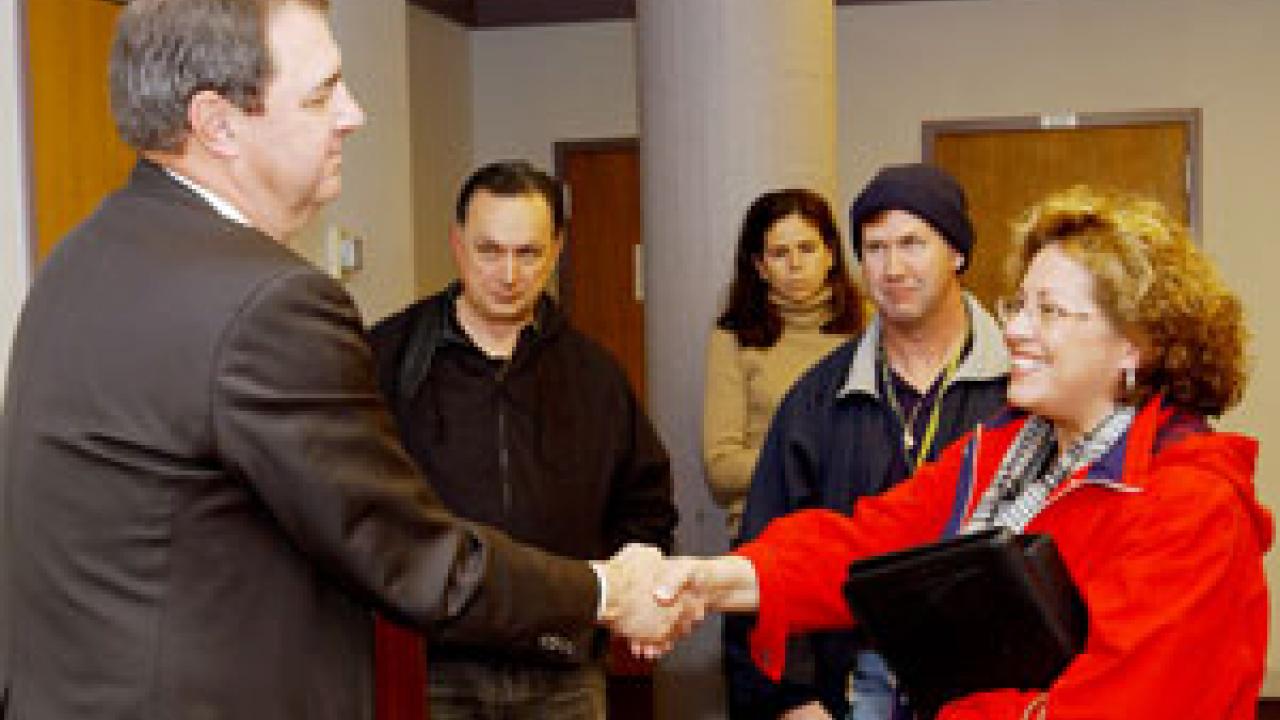Make the case for UC -- and now.
A top UC budget official says it's time to tell state legislators and those in the Governor's Office just how important the university's research powerhouse is to the state's economy.
"We need to make a much stronger case about the link between industry, the economy, and the University of California," said Jerry Kissler, UC assistant vice president for UC budget planning and fiscal analysis. Kissler spoke before almost 200 people at the UC Davis Staff Assembly's winter meeting Jan. 8 in the Memorial Union.
Kissler said that while UC officials can try to influence policy makers on budgetary issues, it's often private industry that argues most effectively for strong research institutions. Toward this, he added, UC needs to call upon its business and private enterprise allies to protect funding in what he describes as California's worst fiscal crisis ever.
"It's no secret that knowledge-based industries in Boston, Los Angeles and San Francisco are located near major research universities," Kissler said. "Somebody's got to do the basic research and they need the knowledge workers. Industry realizes the value of universities."
With charts and diagrams, Kissler described how California's job market demand for "knowledge workers" -- managers and professionals, for example -- has dramatically increased since the early 1980s. Also, average earnings for those with graduate degrees far outpace those with less education, and the unemployment rate for the most educated is the lowest among all educational levels.
"California has shifted to a knowledge-based economy," said Kissler, noting that biotechnology, high technology and health care are among the leading industries in this area.
Despite the current fiscal climate, he said California's economy is "well-positioned for success" in the 21st Century.
Kissler also illustrated how the state got into its budget predicament and why it's important to protect UC funding. The Internet bubble and consequent drop in state revenues from stock options was the biggest factor.
To compound this, the state didn't reduce spending after it began losing revenues. Kissler likened the effect to a credit card binge, with the state borrowing even more money to pay its bills. "No one could agree on what to do about it last year, so they borrowed money."
Now the state has a $15 billion budget deficit for the year ahead, and another $15 billion "permanent structural deficit," as Kissler describes it, for the long run. A $15 billion bond measure for the March ballot is one way the state is trying to cope with the imbalance -- with spending cuts as well.
"That bond measure has to pass or the state will go into a tailspin," said Kissler, who prior to his UC employment advised the state of Oregon on budgetary issues.
The impact so far on the UC system? "We've lost about a $1 billion," said Kissler.
He explained that if the state had continued funding UC's base budget, funded UC's 18 percent enrollment growth, plus covering salary and other cost increases, then the university's budget today would be $4 billion instead of $3 billion.
Kissler said the challenge in the months ahead is for the UC system and state lawmakers to make the kind of budgetary decisions that do not "harm the high quality of the institution in the long run."
In California, he added, the governor has the line item veto, and so can veto parts or all of the spending in a bill or budget.
Kissler noted that a state cannot file bankruptcy -- but California's poor credit rating is already costing the state huge amounts of money through higher interest rates in its borrowing. There's no infinite supply of borrowed money either, he added -- at some point the financial institutions that do the lending will not make any more loans available.
Asked what causes such discord in the state Capitol, Kissler said that legislative term limits and politically safe districts have lowered the trust and familiarity among policy makers. Before term limits legislators and state agency staff got to know one another personally over the years, but now they don't know each very well. In the Legislature, the reality of constant fund raising drains the time of lawmakers after the work day.
"The Governor's Office and the Legislature must trust the state agencies they work with," Kissler said, noting that no amount of reports can turn around intrinsic human emotions.
Kissler welcomed the good news from the Governor's office that the budget proposal will include funding for UC Merced. "We need more college graduates. There's not enough room on the existing campuses to handle the growth."
He implored supporters of outreach programs -- targeted for zero funding in next year's budget -- to lobby their cause. "Outreach is crucial to the state based on its shift in demographics. If we do not have outreach programs, we will create a dislocation" among the underrepresented student populations.
"We have a moral responsibility" to support outreach funding, Kissler said. "And it's in the best interests of the state's economy."
